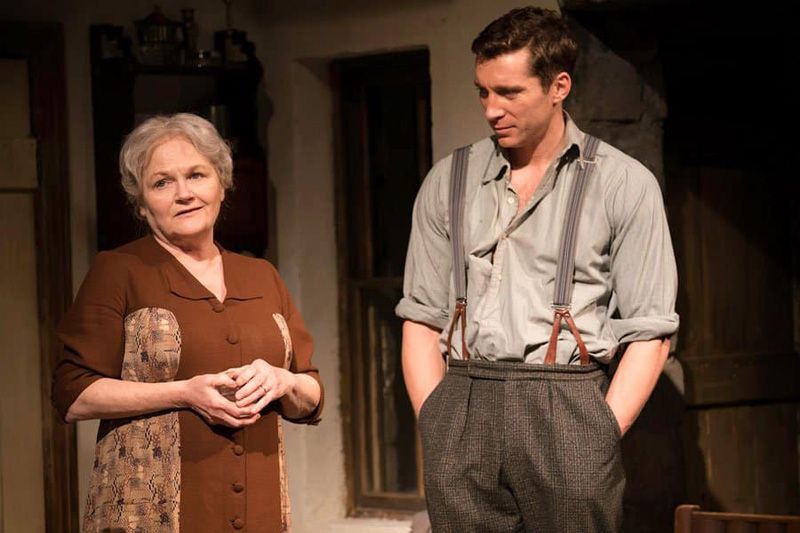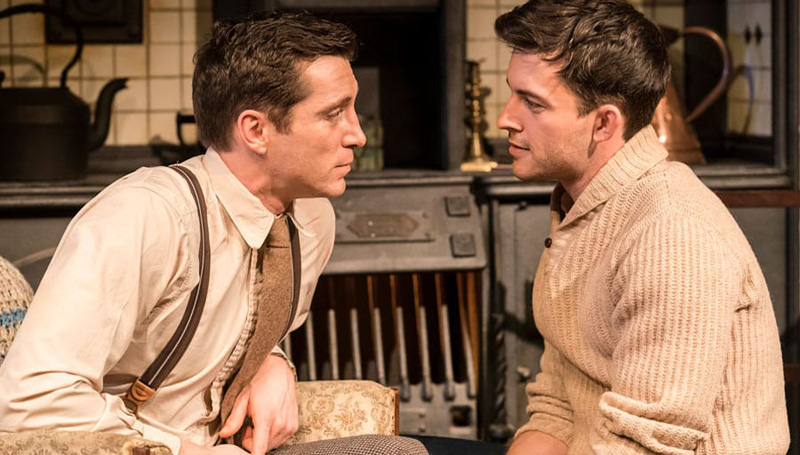“The York Realist”, Donmar Warehouse
Jeremy Malies in Covent Garden
14 February 2018
Peter Gill’s The York Realist depicts two men falling in love during rehearsals for the York Mystery Plays, the re-enactments of stories in the New and Old Testament which have been performed intermittently across the city of York on the feast of Corpus Christi since the fourteenth century. Premiered at The Lowry in 2001, The York Realist has been revived in a stunning production at the Donmar Warehouse.

Lesley Nicol and Ben Batt.
Photo credit: Robert Hastie.
Gill makes the crucial decision to set his piece in the early 1960s soon after a renewal of interest in this set of pageants. It’s an inspiration that allows him to tap into themes that are even more topical now than at the time of writing. George (a dairy farmer played by Ben Batt) has travelled from his remote village in the dales to the city of York and attended a few rehearsals but dropped out. The London-based assistant director of the spectacle (John played by Jonathan Bailey) tracks him down at his cottage and entreats him to continue. One of his pleas includes: “There aren’t many people like you in it. You make it sound right.”
The men begin a relationship and it’s George who initiates the romance. Brilliant as it is, I would find the play even more intriguing if George were less confident of his sexual orientation. Homosexuality would not be decriminalised in the United Kingdom until 1967 and the chapel-attending society that forms the backdrop here would have denounced the pair by quoting Leviticus. George jokingly asks John if he’s worried that a policeman will interrupt them.
This is so much more than a treatment of the love affair. In a crucial speech, George reflects on a trip to London with John and the range of cultural experiences he has had there while also saying that, as a working-class northerner, he has dismissed going to drama school as an impossibility. In the last year, David Morrissey, Stephen McGann and Dame Julie Walters (two Liverpudlians and a Brummie), have all complained about the dearth of actors emerging from less affluent backgrounds in the north with Dame Julie saying she could never have made it today.
The company.
Photo credit: Robert Hastie.
The play abounds in subtext, all of it mined convincingly by the cast under the guidance of Yorkshire-born director Robert Hastie who must have been alive to every idiomatic nuance. The opening run at the Donmar should not be dismissed as London-centric since it will be followed by a transfer to the Crucible Theatre, Sheffield, where Hastie is Artistic Director. Designer Peter McKintosh and costume supervisor Angie Burns show an unerring eye for detail in evoking rural Yorkshire society through choice of props and costumes. It can hardly have been an easy environment to conjure up.
The York Realist excels on every count. In addition to the discussion of broad social and cultural issues, there are wonderful one-liners ranging from the bawdy to the cerebral. A post-performance review of the pageant over the kitchen table at the cottage is riotous. “They cut out a lot of the Old Testament … God had a good voice …. Pontius Pilate’s wife was common.”
Despite the wonderful laugh lines and celebration of the power of theatre, Peter Gill feels no compulsion to give us an uplifting denouement. An initial flash-forward framing device has shown us that the romance will not end well. Ultimately, the happiness of two well-matched people is thwarted by events that could have gone either way and come down to a matter of split seconds. George is left knowing how good an actor he is but with no outlet for his talent and we fear he is about to surrender to a joyless (and probably sexless) marriage to the besotted girl next door. She is played wonderfully with an aching perception by Katie West. “I can’t comfort you can I?”
Fittingly, we end with the Old Testament and the Book of Matthew. “Foxes have dens and birds have nests, but the Son of Man has no place to lay his head.” Jesus has made the point to a would-be disciple that there is a cost to following Him. Gill may be suggesting that George is about to pay the cost for ignoring both his sexuality and his vocation. The Donmar Warehouse is back on form with an exquisite version of a durable and important play.










